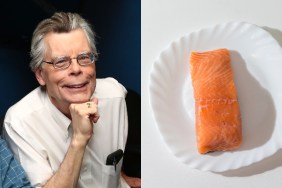Photo: RB/Bauer-Griffin (Getty).

Everybody has a Bill Murray story. Okay, not everybody, but author Gavin Edwards found enough people with quirky tales of the infamously impulsive actor to fill a book. The Tao of Bill Murray: Real-Life Stories of Joy, Enlightenment, and Party Crashing is an enchanting and insightful collection of everyday moments turned magical thanks to Murray’s sly pranks, beneficent deeds, and delightful intrusions on the hoi polloi. This is not your typical celebrity biography, though Edwards packs plenty of historical info on the star in these pages. Readers might be surprised to find that Murray is more multi-faceted than he appears: He has six sons! He co-owns a baseball team! He’s a poetry fan!
Featuring commentary from Hollywood heavyweights and Tao philosophy of lessons to be learned from Murray’s behavior, Edwards crafts a captivating portrait of one of America’s most beloved icons. We spoke to him about what he’s learned in the process of trailing Murray’s trickster legacy.
Crave: How did you initially get interested in Bill Murray? What’s behind the fascination for you?
Gavin Edwards: I was at a point a couple of years ago where I was saying, “If I’m going to sit down and spend a year of my life working on a book, I want a big, American topic.” I made a list of the people who I was fascinated by and it was a short list of two at the end. It was Bill Murray and Prince. I would have been happy to do either of them, but I ended up with Bill Murray. I loved that his life was on all these multiple tracks and that he was living it as fully as possible, that he was a brilliant comedian who had somehow matured into one of our best dramatic actors and whose alter identity is someone who shows up at your party, washes all the dishes, then walks out again. So I started out wanting to know: “What’s that all about?”
How did you go about contacting him, given that he’s made himself pretty inaccessible?
As you know, Bill is “no agent, no manager, no publicist.” There’s a 1-800 number, which I’ve never called, but apparently when you do, it doesn’t even have his voice on it. It’s just a generic greeting. So I was lucky enough to talk to him when I was writing an article about St. Vincent, the movie. Having done that, I said, “I think there’s something going on here” and I started tracking down other people who had encountered him. Some of them were people whose stories had gone viral already, but I got the story of exactly how it happened, the behind-the-scenes stuff that other people didn’t know. There’s an astonishing number of [stories] out there: “Let me tell you about the time he came to my office and brought a popcorn machine” or “Let me tell you about the time I waited tables on him and he said something funny.” People have been saving up these stories for years because he just inspires.
Does he know about the book? And if so, what was his reaction?
Most of the time, as I was working on the book, I assumed he didn’t know about it. I would’ve loved to have dropped him a courtesy note, saying, “Hey, I’m doing this.” But there was no easy way of doing it. Just last week, I got in touch with a good friend of his and sent him a couple of copies, so I’m hoping that one of those is going to end up in Bill’s lap. I don’t know if he’s even going to open it or read it. At the very least, I hope he flips through it and enjoys the art because I think Robert Sikoryak did a genius job and he’ll enjoy seeing himself in the Fantastic Four or in a Van Gogh painting. I didn’t want him to be blindsided by it. I don’t know what he thinks of it. His general reaction to most things like this is “Go ahead and do what you want. Just don’t bother me.” I tried to be respectful of that.
Also: Interview | Dan Slater on American Youth in Mexican Drug Cartel
What was the most unexpected thing you learned about him while working on the book?
Almost all of it was unexpected. Every single day, there would be something that made me laugh, that made me happy. Or I would find a weird thing like he went on an archaeological dig. If I could’ve worked on it for another year, I happily would have.
I’m not much of a golf fan, so I had no idea the extent to which he had made that world his own. At Pebble Beach, every year he gives a command performance. He goes around and he plays and people follow him and he’s funny all day long. He steals hats from people and wrestles in the sandpits. It’s sort of a showcase performance for four days. Bill doesn’t generally hop up onstage at the improv these days, but I’m glad he can do things like that in a sustained way.

Author Gavin Edwards.
Something that surprised me in the book was learning that he has six sons. I didn’t even know he was a father.
Yeah. He asked me if I had kids and I said, “Two sons.” He sort of nodded and said, “That’s a good start.” Not everybody knows this but it’s not a secret, either. He has said—he’s had a couple of ugly divorces—that the only upside to divorce is he ended up being closer with the kids as a result.
Did you speak to any of his sons?
I did not. I was interested in the public face of Bill. When I was interviewing him before, I knew that he didn’t want people contacting his family and friends. I wanted to be respectful of that. I spoke to anybody who had a delightful moment with Bill but didn’t know him well enough to say, “Ooh, Bill’s my friend. I’m violating his privacy.”
Did you find anyone who had a negative story or did not appreciate being “woken up” by Bill Murray?
I don’t know that I have anyone who didn’t appreciate being woken up. I did sort of encounter some stories where it didn’t “work.” Somebody told me about driving through Times Square with Bill Murray in her backseat and passing by a Broadway theater where there were like 100 people gathered outside the stage door, waiting for someone to come out, and Bill figures he’ll give them a little moment of “Oh my god, this thing happened that we didn’t expect—Bill Murray came by!” The guy went to the stage door. Nobody even paid attention to him. So he just kid of shrugged and moved on.
I have another friend who saw him once having an argument in an elevator with somebody. So, you know, Bill has bad days. I certainly spoke with people who have worked with him who see both sides of him: that he can be brilliant and generous and he can also be difficult and temperamental. You put up with the difficult and temperamental because you get the brilliant and the genius and you’re happy you did at the end of the day. I think when he’s out and about with people, he is careful to put his best foot forward. He’s a pretty good judge of who wants to be woken up.
If he wasn’t a celebrity, would this behavior be as charming or would we dismiss it as the behavior of an eccentric or someone’s who mentally ill or an alcoholic?
[Laughs] I can say that he gets away with a lot because people know who he is and love him. When he starts a snowball fight in the street, he picks somebody, the guy looks up, he’s angry, but then he sees it’s Bill and it in some way transforms into a childlike delight. It gives him a safety net for people who wouldn’t respond to it so well, but he does pull it off in places where people don’t know who he is at all. He goes to Indonesia and he’s in a small village and nobody’s seen any of his movies and here’s this brazen American doing pratfalls and physical comedy. He finds a way to engage people wherever he is. I think he would probably do it differently if he weren’t a movie star, but I think that even if he was a bank teller who did community theater twice a year, he would still find a way, it would just not be as wide ranging. I think he could pull it off without being the town crazy.
Did you come up with “The Ten Principles of Bill” in the book or did he?
I did. That was not Bill coming with the stone tablets off the mountain. That’s me, looking at what he’s done and trying to learn from what he’s done.
What is the number one thing you hope readers take away from Bill Murray?
A sense of spontaneity. Don’t live life on auto-pilot. And that can manifest in a lot of different ways. If you’re in a creative field, don’t go for the easy choice. But even in daily life, like you walk by the coffee guy and say, “How’re you doing?” Maybe just say something off-balance. The world can be a fascinating place when you’re not doing it the same way over and over. I think that’s the lesson of how Bill lives his life. Nobody can do that all the time, but I do try to do that in my own life as well.
So do you think you’ll write that book about Prince now that he’s passed away?
As I was doing this book, I realized I had come up with an alternate way of doing a biography. Not many people have so many anecdotes about them where whatever they do in public, they leave a trail of stories behind them. Prince is one of those people. I don’t think it’s going to be the next book I do, but I would love to come back a couple of years down the road and maybe do something similar with Prince.






